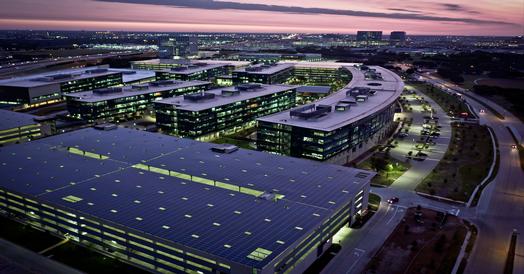
The first three challenges focus on carbon and call for eliminating—not just reducing— greenhouse gas emissions from new vehicles, operations and supply chain activities. The fourth challenge addresses water availability and quality, while the fifth and sixth challenges seek to move closer to contributing to a recycling-based society and protecting nature.
Challenge 2050 is inspiring Toyota team members, partners and customers and connecting them with the company’s core commitment to sustainable mobility. Guided by the six challenges, Toyota is making progress towards creating a net positive impact on the planet.
In the recently published 2018 North American Environmental Report, Toyota outlines positive impacts made across North America. In 2018, Toyota announced it is building the world’s first megawatt-scale tri-generation plant, which will supply Toyota’s vehicle logistics operation at the Port of Long Beach with three key components of the operation: 100 percent renewable power, 100 percent renewable hydrogen fuel, and clean water. Additionally, Toyota’s North American manufacturing plants recycled or reused 148 million gallons of water, the equivalent to the annual water use of 1,351 average American families.
“The Toyota Environmental Challenge 2050 is the most demanding and most inspiring environmental commitment this company has ever made,” said Toyota Motor North America Director of Environmental Sustainability, Kevin Butt. “Our success will come from a combination of continuous improvement and new ideas. And it will come from strategic partnerships, education and sharing our environmental know-how with others.”
Additional highlights from the 2018 North American Environmental Report include the following:
CARBON
- Toyota and Lexus have 16 advanced technology vehicles on the market in North America, with cumulative sales topping 3.3 million.
- Toyota’s 8.79-megawatt solar array at our Plano headquarters campus produces about one-third of daily electric needs for the campus. It is the largest on-site corporate solar installation among non-utility companies in Texas.
WATER
- Toyota’s assembly plant in Mississippi has reduced absolute water use by 32 percent in the last two years. Last year, the plant began using 1.4 million gallons of recycled water in the cooling tower.
- Toyota continued to sponsor the National Mayor’s Challenge for Water Conservation with the Wyland Foundation. Since launching the national campaign in 2012, U.S. residents have pledged to conserve 12.3 billion gallons of water.
MATERIALS
- Toyota uses a variety of sustainable materials in our vehicles, including post-industrial denim and other cotton and synthetic garment clippings in door panel insulation, floor silencer and floor mats.
- A team at Toyota’s Indiana assembly plant made a significant reduction in raw material use by decreasing the amount of PVC sprayed onto Sienna underbodies, with zero impact to quality. The amount of PVC per Sienna was reduced by 0.16 pounds, but with 150,000 Sienna minivans assembled annually, that’s a 24,000-pound per year material savings.
- For several years, Toyota sites have hosted household waste collection events for team members and surrounding communities. These sites have invested close to $1 million to ensure more than 2 million pounds of material were either recycled or properly disposed.
BIODIVERSITY
- Toyota has about 1,000 acres at 12 sites engaged in conservation programs certified by Wildlife Habitat Council® (WHC).
- Toyota planted a new 11,000 square-foot pollinator garden outside the Visitor and Education Center at the Texas assembly plant. The plant is also partnering with the San Antonio Zoo to plant pollinator gardens at six local high schools.
- Toyota’s Woodstock plant in Ontario opened the Wetland Trail, which meanders to the north of the assembly plant through 200 acres of wetlands and woods. The trail is a gift to the community to mark the 30th anniversary of Toyota Motor Manufacturing Canada.
OUTREACH
- In 2017, Toyota’s support for National Public Lands Day made volunteerism possible at 2,100 sites, where 169,000 volunteers gave 680,000 hours of service worth $16.7 million.
- Toyota is proud to join the ranks of the top 10 companies with the most LEED®-certified retail locations (excluding financial institutions with retail bank locations). Toyota is the only automotive brand to be included in the top ranks (as of July 2018). In the U.S., Canada and Mexico, 61 Toyota and Lexus dealers have been awarded LEED certification.
- Toyota is working with logistics suppliers to reduce CO2 emissions from transport activities. Ryder has replaced 29 diesel trucks that move goods for Toyota’s assembly plant in Kentucky with trucks that run on renewable compressed natural gas (CNG). By 2021, Ryder hopes to convert one-third of its Toyota-dedicated fleet to renewable CNG.
To view the full report, visit https://www.toyota.com/usa/environmentreport/
Through the Start Your Impossible campaign, Toyota highlights the way it partners with community, civic, academic and governmental organizations to address our society’s most pressing mobility challenges. We believe that when people are free to move, anything is possible. For more information about Toyota, visit www.toyotanewsroom.com.